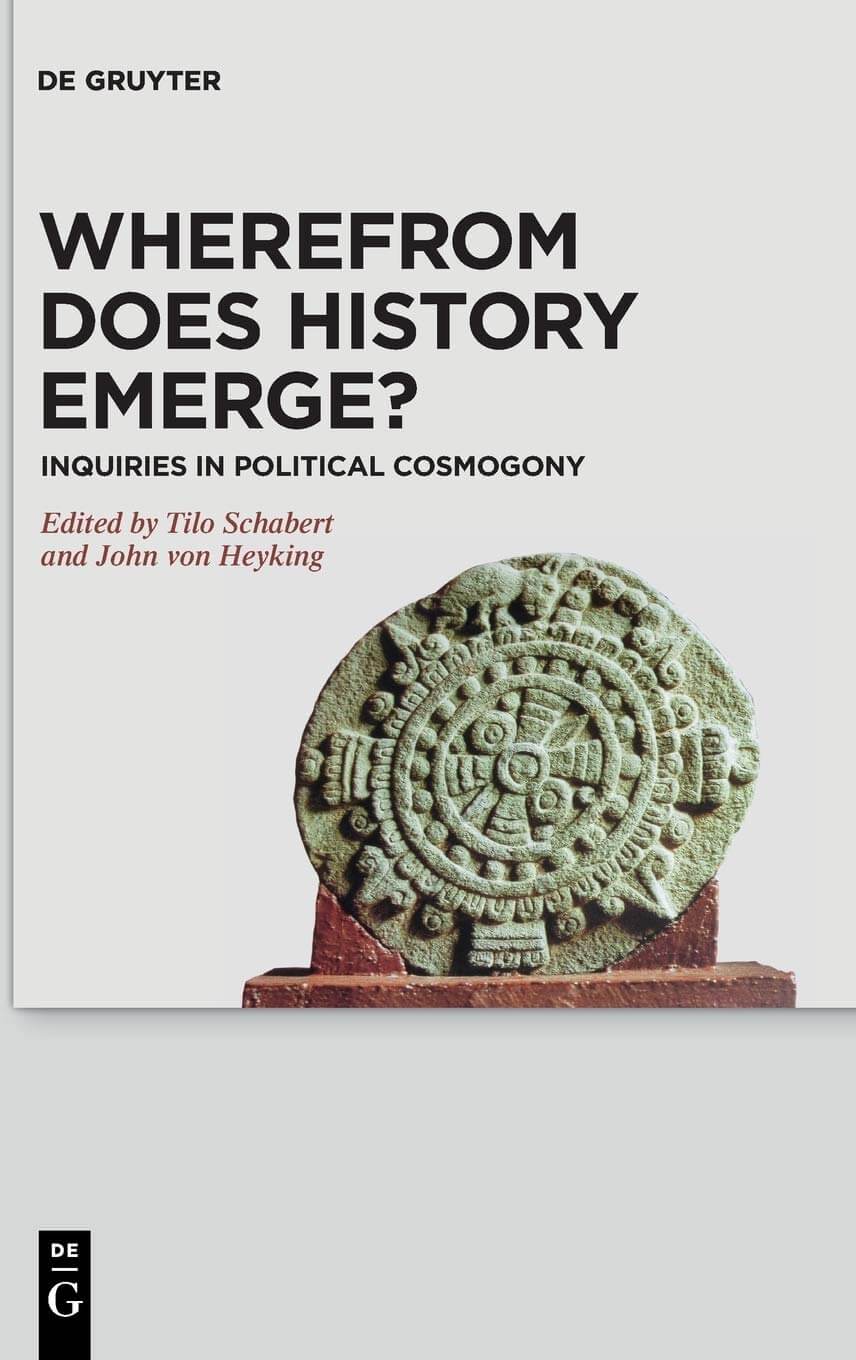Wherefrom Does History Emerge?

Wherefrom Does History Emerge? Inquiries in Political Cosmogony. Tilo Schabert and John von Heyking, eds. Berlin: De Gruyter, 2020.
The premise of Wherefrom Does History Emerge? is that the activity of politics is a type of political cosmogony: the reflection or imitation of the cosmos with its natural order of the movement of the stars and the rising and setting of the sun. However, this order is always under the threat of disorder or chaos. Under the statesman, political order resembles the cosmic one with symbols and tales representing the emergence of order from chaos. Thus, political order is legitimatized because it is natural.
This volume examines two specific questions of the cosmo-historical problem: 1) what is history, i.e., the human experience of a continuing actuality of chaos and cosmos; 2) the response to the experience of human suffering that makes the experience of history meaningful. For these contributors, history is a story of self-interpretation, whether for the individual or society, that responses to the interplay between the ordered cosmos and disorderly chaos. It is an experiential process where human beings write “history” in their souls, attempting to make sense of their existence.
In his study of Washington Irving’s Rip van Winkle and James Joyce’s Ulysses, Dieter Fuchs examines the nature of beginning in historical accounts. Whereas Irving proposes a linear approach to history, basing American founding myth of independence on the history of ancient Greece, Joyce portrays a cyclical account where history follows a repetitive pattern. For Joyce there is neither beginning nor end.
The driving force in history, according to Manuel Knoll, is the human desire for wealth, possessions, and domination. In his study of Greek antiquity, Knoll observes that the Greek cities were in a state of constant warfare with peace being the exception. This condition led both Plato and Aristotle to develop a theory of the soul so that the soul should be ordered towards peace and reject pernicious desires that made humans strive for war.
In his examination of Thucydides, Jonathan Wensveen argues there is no cure for chaos, for chaos always accompanies the cosmos. Humans are forever subjected to war. But against this chaos, order can be built. By looking at Thucydides for guidance, Wensveen argues that we can build and maintain order by preventing a civilization devolving into barbarianism and warfare. Critical is to stop changes in public language, manners, and laws; otherwise, civilization decline is inevitable.
John von Heyking proposes friendship, particularly among political leaders, as an additional way to maintain political order. In his analysis of the Odyssey, Heyking argues that is a journey from loneliness and speechless to friendship and public speech, and from Odysseus’ journey we see how history emerges in action and shared story-telling. It is this sharing of tales that political leaders become self-conscious of their friendship to maintain political order.
Another type of storytelling is religious which Antonio Panaino accounts in his study of Zoroastrianism. Two divinities are at war with each other with humans caught in-between. In this religious tale, humans play a central role in the story of the world with rituals being a weapon against evil. History consequently emerges because human mortality, time, makes us realize the beginning and end of our existence.
David Carrasco’s chapter also includes a story but this one based in historical reality with the 16th century confrontation between the Aztecs and the Spaniards. Focusing on the union between an Aztec woman and Fernando Cortes, Carrasco not only the highlights the fluidity of identity among members of different civilizations but how the history of Mexico began. New Mexican cosmologies superseded the Aztec worldviews and thereby established a new political order.
Eiko Hanaoka returns us to a religious account with Buddhism. According to Buddhists, human desire cannot be crushed, so evil and suffering will remain with us. Yet one can live in action, thereby producing history, and but it requires one to be detached from one’s egocentric self to find harmony with oneself, other humans, and the cosmos.
The concluding chapter is Tilo Schabert who asks the question from where does history emerge? He directs us to Herodotus, Thucydides, Virgil, Flavius Josephus, Augustine, Erasmus, Kant, and Hegel to find an answer. The answer shared by all of these thinkers is that through the history they produce they create their worlds. The source of this creativity is the forces of nature or cosmos. Schabert ends with figure of the judicious person as the most adequate and proper response to the question of history and political order.
The themes of history examined in Wherefrom Does History Emerge? will be familiar to Voegelin readers. The book provides excellent analyses of case studies about the question of history and how different civilizations account for their relationship to the cosmos. For those interested in the question of history and where it comes form, this book is the one to consult.




